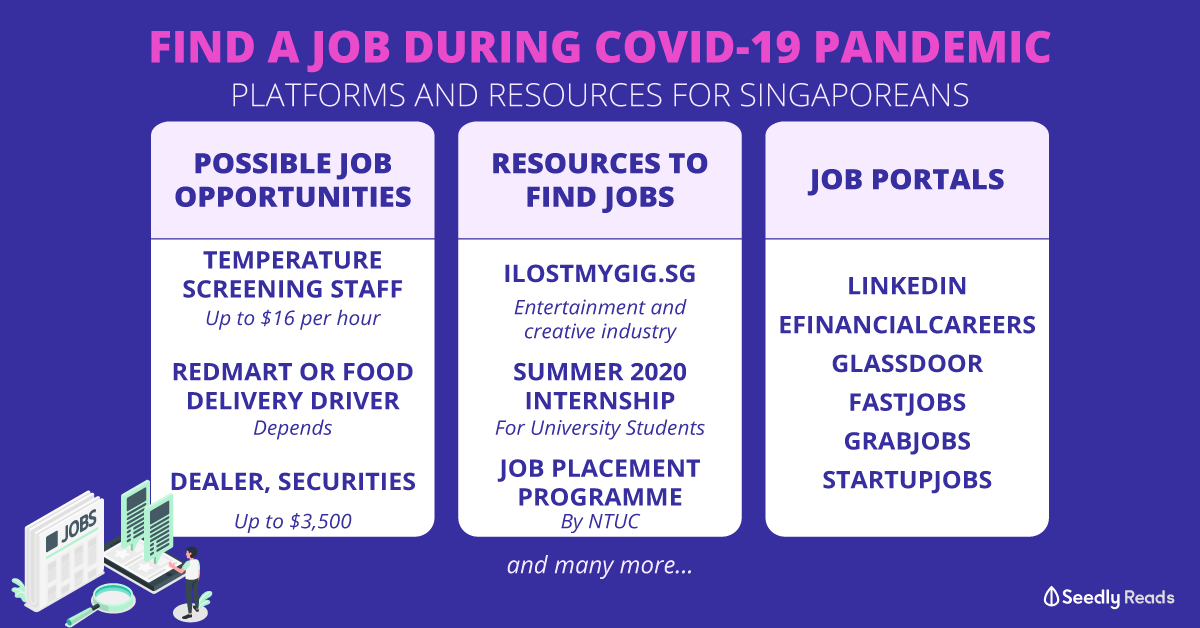Hi Anon,
The Resilience Budget by the Singapore Government is indeed an unprecedented response for unprecedented times. DPM Heng has warned that Singapore is likely to face “its worst economic recession since independence” as a result of being deeply impacted by Covid-19.
The Government is setting aside a further $48.4 billion to support businesses, workers and families, on top of the previous $6.4 billion in measures previously announced in Budget 2020 just a month ago. This brings the total amount to $55 billion, which is 11% of Singapore’s GDP, that the Government is giving to help combat the impacts faced from Covid-19.
Here are 5 ways the Supplementary Budget will help workers:
1. Saving jobs
The Government will co-fund 25% of local workers’ wages until December 2020
Heavily impacted industries like air transport, tourism and food services, firms will receive higher co-funding. Firms in the food services sector will receive higher support at 50% of wages and firms in the aviation and tourism sectors (most badly affected sectors) will be supported at 75% of wages
Those earning up to $4,600 monthly will qualify, up from $3,600
Jobs Support Scheme will be extended, with payouts in May, July and October
$15.1 billion allocated to support more than 1.9 million local jobs
2. Helping self-employed persons
Provide direct cash assistance for self-employed persons through Self-Employed Person Income Relief Scheme (SIRS)
Eligible self-employed persons will receive $1,000 cash per month for 9 months
Provide sustained support for self-employed persons to make use of this period to train and upskill through the Self-Employed Persons Training Support Scheme
3. Helping lower income workers
- Workers under the Workfare Income Supplement Scheme will receive an enhanced Workfare Special Payment. Each will get a one-off cash payment of $3,000
4. Helping the unemployed
COVID-19 Support Grant will provide lower and middle-income workers who lost their jobs with $800 every month for 3 months
More flexibility in granting applications for ComCare during this period
Temporary Relief Fund to be set up in April for needy families who need help urgently
5. Helping jobseekers
New SGUnited Jobs initiative will create about 10,000 jobs over the next one year
SGUnited Traineeships programme will give first-time jobseekers and young Singaporeans more opportunities, supporting 8,000 traineeships this year
While these measures will not be able to wave off a recession, they will be able to soothe the concerns workers have over losing their jobs or not having an income. These initiatives will be able to provide support for workers until at least Dec 2020 and will help boost consumers' confidence to spend, which will be crucial for a healthier economy and the survival of businesses.









Hi Anon,
The Resilience Budget by the Singapore Government is indeed an unprecedented response for unprecedented times. DPM Heng has warned that Singapore is likely to face “its worst economic recession since independence” as a result of being deeply impacted by Covid-19.
The Government is setting aside a further $48.4 billion to support businesses, workers and families, on top of the previous $6.4 billion in measures previously announced in Budget 2020 just a month ago. This brings the total amount to $55 billion, which is 11% of Singapore’s GDP, that the Government is giving to help combat the impacts faced from Covid-19.
Here are 5 ways the Supplementary Budget will help workers:
1. Saving jobs
The Government will co-fund 25% of local workers’ wages until December 2020
Heavily impacted industries like air transport, tourism and food services, firms will receive higher co-funding. Firms in the food services sector will receive higher support at 50% of wages and firms in the aviation and tourism sectors (most badly affected sectors) will be supported at 75% of wages
Those earning up to $4,600 monthly will qualify, up from $3,600
Jobs Support Scheme will be extended, with payouts in May, July and October
$15.1 billion allocated to support more than 1.9 million local jobs
2. Helping self-employed persons
Provide direct cash assistance for self-employed persons through Self-Employed Person Income Relief Scheme (SIRS)
Eligible self-employed persons will receive $1,000 cash per month for 9 months
Provide sustained support for self-employed persons to make use of this period to train and upskill through the Self-Employed Persons Training Support Scheme
3. Helping lower income workers
4. Helping the unemployed
COVID-19 Support Grant will provide lower and middle-income workers who lost their jobs with $800 every month for 3 months
More flexibility in granting applications for ComCare during this period
Temporary Relief Fund to be set up in April for needy families who need help urgently
5. Helping jobseekers
New SGUnited Jobs initiative will create about 10,000 jobs over the next one year
SGUnited Traineeships programme will give first-time jobseekers and young Singaporeans more opportunities, supporting 8,000 traineeships this year
While these measures will not be able to wave off a recession, they will be able to soothe the concerns workers have over losing their jobs or not having an income. These initiatives will be able to provide support for workers until at least Dec 2020 and will help boost consumers' confidence to spend, which will be crucial for a healthier economy and the survival of businesses.